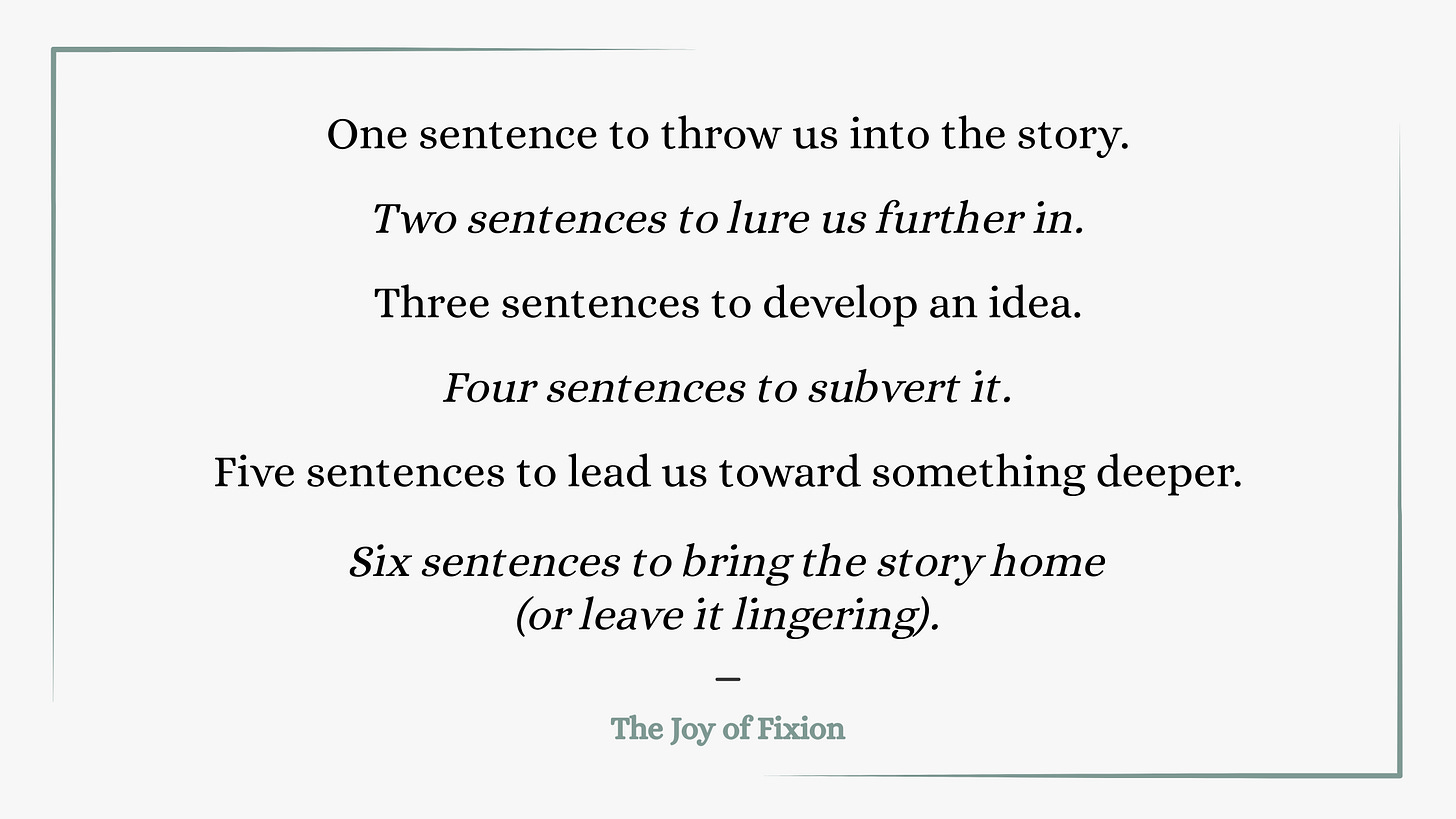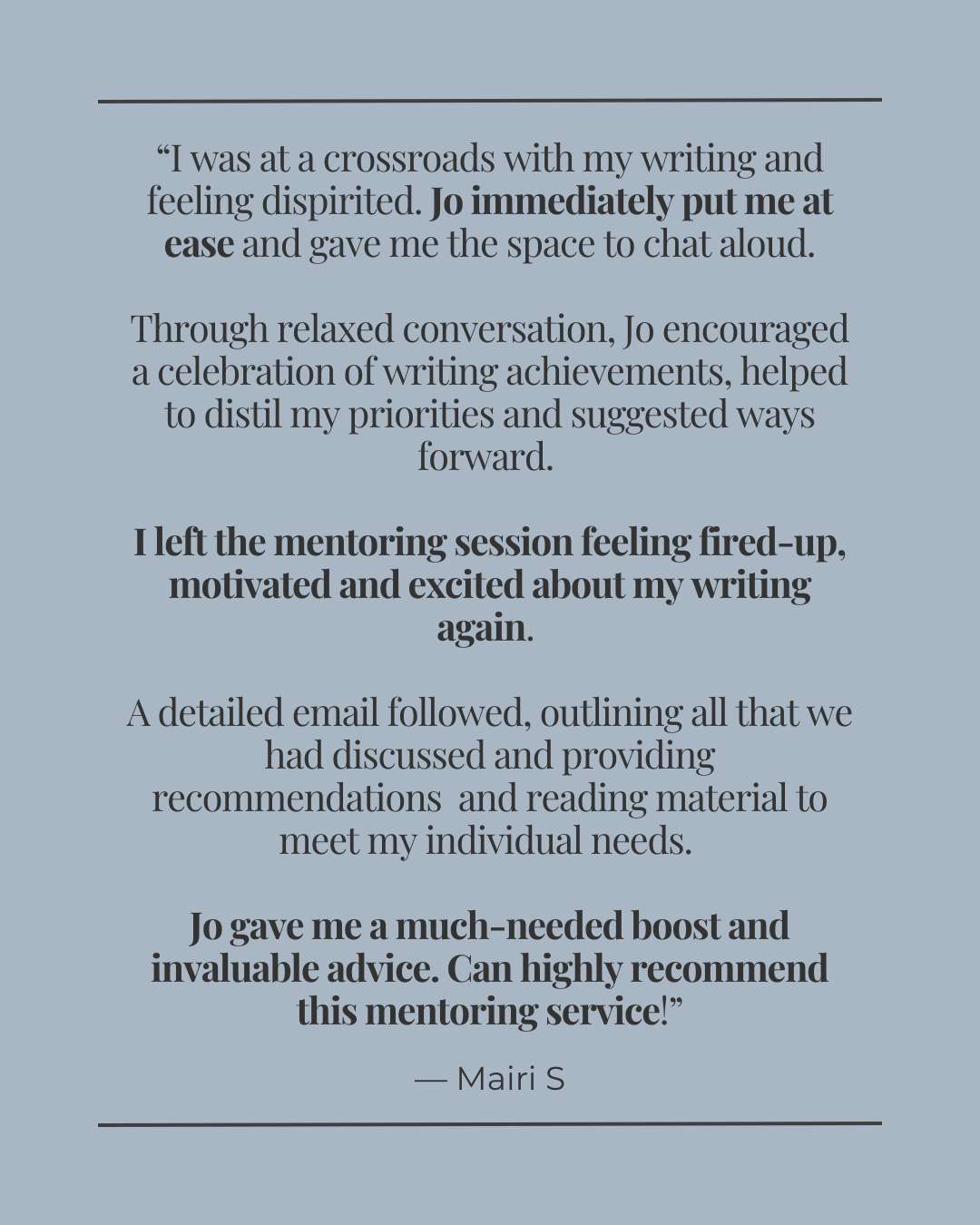Exploring how to ‘fix my fiction’ one month at a time. Writing, editing, reading creative mooching, and making up my own literary lessons as I go.

This month’s Fixion Lessons are brought to you by the theme of restriction.
The inside of my brain is kind of an Everything, Everywhere, All At Once situation.
All the variables. All the hypotheticals. (All the overwhelm.)
But also: All the ideas! All the stories! All the time!
But oh no. So many stories, I’ll never possibly be able to write them all in one lifetime… Especially when there are so many options — so many ways of getting it wrong — so many different potential ways of expressing an idea — that sometimes they get stuck in a purgatorial ‘what if?’ phase.
Choice can be paralysing sometimes. Even if all the choices are things I want to write about.
So, sometimes a bit of restraint is needed.
A Restriction of Words
My best writing tool is a word limit. Or an imminent deadline. Or a very specific set of requirements.
I think that’s why I like flash fiction. Say it in 1000 words or fewer. Now cut it down to 750. What about 500? Make it 300, just for fun?
Why not just six sentences?
A few weeks ago I was editing some microfiction drafts and browsing places to submit to (the submissions cycle is another form of restriction that kicks my writing arse — find the right story of the right length and the right style for the right publication, and repeat).
I set my sights on Gooseberry Pie Lit, which has been high on my list for a while. I really like the stuff they publish, and I really like the challenge of their submission guidelines:
Stories with exactly six sentences
400 word limit
What’s fascinating is how many of my micros already kind-almost-nearly fit this configuration. Or if they didn’t, they were better for editing down to six sentences.
I’m not sure where the six-sentence story theory originated, but I’ve seen it used a lot in writing exercises and workshops, and there’s something magical about it as an editing practice — even if you end up breaking the pattern — because it makes you consider every single word, every single line, every choice you make, to tell the story as efficiently and emphatically as possible.
You can even apply the ‘rule’ of six to a paragraph or scene in a longform piece of work. Can you describe a new setting and establish a scenario with just six sentences? Can your characters cover the main points of an important conversation in six lines of dialogue? Can you figure out what it is you’re trying to say — and say it — with a tight lil’ sixer?
Try it and see.
(Was this a preamble to brag that one of my stories did in fact get accepted by Gooseberry Pie, and will be published in August? Perhaps. Or is it just a good example of how this kind of literary pruning can turn a several-times-rejected piece into a ‘yes’? Perhaps, too.)
Side Quest:
This also reminded me of a little writing prompt generator I used to use daily back when I was just starting to write flash: One Word
Click the button. It gives you a word. You have 60 seconds to write about it.
A lot of my tiny stories started out this way. Some of them became much longer. Some stayed pretty minimal. Some got published.
The restriction of time and subject works, too.
A Restriction of Theme
As well as submitting stories, I’ve also been selecting stories and poems for the lit mag I co-edit, Thread.
Since this little experiment in publishing began on the social platform Threads (clue’s in the name), submissions have a character limit of 500, to fit within a singular post. So already we have the restriction of words. Check.
On top of that, for each issue, we assign a specific (and yet broad) theme. Past examples have been typos, expanse, stasis, and our latest call: numerical (out very soon — and a brand new call coming a little after that!).
More fascinating patterns arise when you restrict a writer’s thematic options.
First, we tend to land on the most familiar, obvious, recognisable connections to that theme. Which makes sense. We’re figuring out the boundaries of this new restraint. Our brains are riffling through the catalogue of associations, connotations and metaphors that might become the seed of a story.
But if we stop there, chances are our submission will look very similar to hundreds of others that have gone through the very same process.
However, if we move past those initial instincts — using the restriction of theme as an anchor point, while also stretching its limits — one of two things tends to happen.
Either you find an interesting or personal way to play with a familiar concept
Or you find a loophole, subversive interpretation, or new way to explore that concept
That’s where we tend to find the pieces that really hit — in that push/pull of restriction and expansion. And when we can only select six (clearly the magic number today) out of hundreds of submissions each issue, we’re really looking for the ones that break the pattern somehow.
(I also talked about this — and other slush pile observations — in a lot more detail in my How to Make Your Submission Stand Out webinar with
.)Try it. Find a themed call. Exhaust all possible knee-jerk responses to concept, structure, analogy etc, and see what lies beyond…
Side Quest:
If you write a lot of flash, poetry or short fiction, I also highly recommend assigning yourself a theme to start building a collection, chapbook, or novella-in-flash.
I’ve been slowly collating pieces on a (very loosey-goosey) concept around space, the universe, and our tiny little speck-like existence, and it has been an endlessly curious and challenging practice in restriction and exploration.
A Restriction of Form
I actually started out writing screenplays and studying film and TV at uni — then somehow got sidetracked by novels, short fiction, poetry, interactive fiction, playwriting, before finally making my way back to one of my first literary loves.
I think there’s a restrictive element of screenplays that feeds my need for structure, while tempting my urge to rebel. Except this time, it’s the format that provides and requires restraint.
At its core, a script is an instruction manual. It tells you where you are, what you’re seeing, what you’re hearing, what the atmosphere is like, what the characters are saying and doing, and what kind of emotional undertones might be coming through in the process.
But we don’t get to peek into the characters’ heads like we might in a novel. We don’t get to loiter on backstory and exposition. We have to string together contextual, visual, and conversational clues to allow the viewer to create the pattern themselves.
And while the strict time (or page) limit and formulaic format can sometimes feel frustrating, the restriction is also incredibly freeing. Because just like honing a micro down to six sentences or adhering to a specific theme, the nature of a script challenges you to get rid of all the fluff and get to the point. To show without (verbal) words, if you can. To manifest your subtext without being too on the nose. To find innovative ways of visualising your ideas with only SCENE HEADING, ACTION and DIALOGUE to choose from.
Try it — read the script of your favourite film (many can be found online as PDFs) and analyse how it’s constructed. Then apply the same treatment to a scene in your WIP. You don’t have to format it as a script, but think about what each moment would look and sound like, shot by shot. And see how efficient you can be with your storytelling.
Side Quest:
I’m currently three-ish weeks into the ‘20 Weeks to a Final Draft’ programme with Lauren Greenwood from
and the time restriction is working wonders (the really good kind of creative pressure), not to mention her 9-act structure approach to getting the first draft out with as much detail as humanly possible.One of the added restraints I wanted to place upon my scriptwriting was to write something that could be filmed on a low budget (because all my ideas seem to come out ridiculously high concept). Aaaaand somehow I’ve ended up writing a zombie movie, so look, you can’t win ‘em all. But if you’re looking for more screenwriting advice, I highly recommend Lauren’s posts!
Other Fixioning, Writing, Reading, Editing & Creating Stuff from June
I posted up the final lesson of my Story in a Song workshop here on Substack — a four-part love letter to music and writing with hundreds of mini writing prompts and exercises inspired by atmospheric songwriting.
I’m tinkering with a revamp of my Unfuck Your Writing workshop, perhaps once we’ve all got through this liminal heat-death of a summer… For updates, make ure you’re subscribed here, or on my website mailing list.
I’m currently reading the third books in both the Steerswoman series by Rosemary Kirstein and the Murderbot series by Martha Wells, and I never want either of them to ever end. (I also need to stop reading until 1 am. It’s getting out of hand.)
My story, Non-compliance, was published in the FlashFlood for National Flash Fiction Day in June — one of my favourite flashy days, and a treasure trove resource for reading a wiiiiide variety of flash stories.
My TV pilot script, Free Traders, made the top 1.8% of the BBC Writers Open Call and is in consideration for their Voices development programme. Consider my flabbers well and truly gasted!
My editorial feedback queue is still full, but I am still open for one-to-one writing development mentoring consultations if you’re in need of some brainstorming, soundboarding, and problem solving to get your WIP to the next stage. (Or need me to impose some gentle restrictions on you…)
Happy writing : )








Ahhhh, Jo! Thank you so much for the glowing write up. I tried the 60 second story prompt and I am howling at what my strange brain vomited out. I think I've found my new hobby!!! I submit it here for your reading pleasure(??). By the fourth sentence it reeeeeallly wanted to be a poem...
Merry goes around the world. She was a woman named Merry and she wasn't very happy at all. She was a sad little bitch. She travelled the world in a sad little balloon and she never stopped flying until she hit the moon. Who knew what pleasures she could find if she'd finally end her balloon ride.
Thank you.
I just wrote a journal entry titled: Restriction Breeds Clarity. In essence, it states that life is best curated through challenges that grow us into smarter, more caring, more brave people.
Unfortunately, we still do not do life, wisely, in that most of our challenges are toxic and unnecessary.
We think freedom means letting it all hang out, but freedom only comes from voluntarily restricting our worst tendencies. Freedom is a by-product of restriction. You might even say abundance is a by-product of restriction.
All this ties into the conclusion I'd already come to: My lengthy book begs me to make it a tight, textured, flavorful book on freedom.